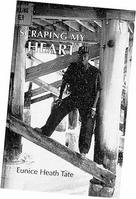
Title: Scraping my Heart
Author: Eunice Heath Tate
Publisher: Jukebox Press
Reviewer: Barbara Nelson
Halfway through the 155 pages of this poignant story of a mother's deep pain at losing her child the reader could wonder if the author, Eunice Tate, will ever get over the tragedy. She does not get over the tragedy; instead she gets through it and tells us how "you find peace one moment at a time".
Her son, 24-year-old Buroppe 'David' Edwards was brutally murdered in Rochester, New York, in March 1996. The Jamaican-born Tate - a writer, poet and novelist writes about his death as a step towards her own healing. In doing this, she has opened a door for others to see that the experience of death is 'not an ending' but 'a place to discover yourself'. In fact, she gives a blueprint for healing and a diagram to reconnecting with one's true self.
Tate has a unique and compelling style of writing. She understands the power of the word. She is honest and brave. She describes her son, her second child as "not perfect" but "he was my soldier". As a young man, he often frustrated and disappointed her and he and his friends "all seemed to be waiting for their dreams to come true, but doing nothing towards making them happen. They wanted things to be done quickly and easily." But she knew that her son loved her - "His love was, at times, intoxicating and all consuming, but it was also steady and certain".
Heart-breaking journey
She takes us with her on a long, difficult and sometimes heart-breaking journey from shattering grief to peace. "I conceived that my soul will forever bear the stretch marks inflicted by the loss and the gruesome details surrounding my son's death ..." She opens up the past and describes David's birth, the hardships in her early life - "I am woman, I know how to live on nothing" and says she believes that "David suffered most from not having his father in her life".
Tate has the gift of using words that pull the reader into the very depths of her experiences and emotions - how "the world came to a standstill when the phone call came", "the magnitude of the pain" she felt at the loss of her child and the desire to remain "in the wounded state savouring the grief".
But after the emotional shock and the long period of darkness, pain and anger, she allowed herself to experience healing that "comes with a timetable of its own" and she learned to laugh and open up herself to light and to change.
This is a book that will stir a person's emotions and challenge the reader (not just mothers who have lost a child) to move away from the dark places in one's life that bring pain to a place where there is forgiveness, healing, and wholeness.

